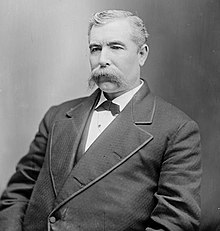Thomas L. Young
Thomas Lowry Young (born December 14, 1832 in Killyleagh , Ireland , † July 20, 1888 in Cincinnati , Ohio ) was an American lawyer and politician ( Republican Party ) and from 1877 to 1878 the 33rd governor of the state of Ohio.
Early years and political advancement
Thomas Young attended local schools in his Irish homeland. In 1842 his parents emigrated to America and settled in New York City . The young Thomas joined the US Army as a military musician in 1848 and took part in the final phase of the Mexican-American War . He remained in the army until 1858. He then moved to Cincinnati, where he worked as a teacher. Young also took part in the civil war and rose to the rank of colonel in the Union Army . In September 1864 he was honorably discharged from the army for health reasons.
After returning to Cincinnati, Young studied law. He was admitted to the bar in 1865. Then he began to practice in his new profession in his hometown. Between 1866 and 1868 Young was a member of the Ohio House of Representatives . In 1867 he was also a registrar ( recorder ) in Hamilton County . In 1868 he was a delegate to the Republican National Convention in Chicago , where Ulysses S. Grant was nominated as a presidential candidate. Between 1871 and 1873 Young was a member of the State Senate, and from 1875 he was Lieutenant Governor of Ohio.
Governor and Congressman
On March 2, 1877, the incumbent Governor Rutherford B. Hayes resigned from his office because he had been elected as the new US President . This meant that Lieutenant Governor Young had to end the remainder of Hayes' term in office. This ran until January 14, 1878. His term of office was initially calm. In the summer of 1877, however, violent workers' unrest at the railroad broke out in Pennsylvania and Maryland , resulting in high property damage and even some deaths. The riots then spread to Ohio. The governor called in the National Guard to restore order. Order was restored by the beginning of August. The governor was proud to have achieved this without the help of the federal government. Other states had asked the president for military help, who then sent the US Army.
After the end of his governorship, Young remained politically active. Between 1879 and 1883 he represented his state in the US House of Representatives . There he was chairman of the patent committee. After returning from Washington, DC , he returned to Cincinnati as a lawyer. He was also on that city's public relations committee. Thomas Young died in July 1888. He was married three times and had a total of eight children.
Web links
- Thomas Young in the National Governors Association (English)
- Thomas L. Young in the Biographical Directory of the United States Congress (English)
- Thomas Young in the Ohio History Connection Archives
- Thomas L. Young in the database of Find a Grave (English)
| personal data | |
|---|---|
| SURNAME | Young, Thomas L. |
| ALTERNATIVE NAMES | Young, Thomas Lowry (full name) |
| BRIEF DESCRIPTION | American lawyer |
| DATE OF BIRTH | December 14, 1832 |
| PLACE OF BIRTH | Killyleagh , Ireland |
| DATE OF DEATH | July 20, 1888 |
| Place of death | Cincinnati , Ohio |


